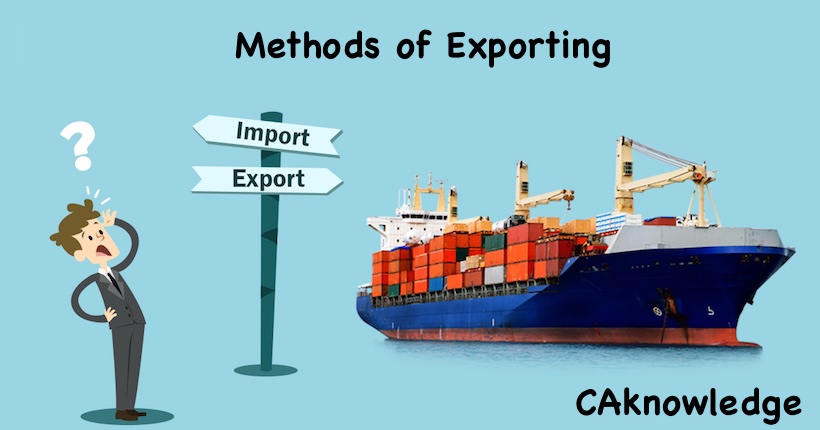What are the methods of exporting? Merits and De-merits of direct exporting and indirect exporting. With the adaptation of globalization and the advancement of technology, world is shrinking day by day. World has become a global village unlike never before in the history. This has paved the way for the businesses to reach out to the world market by exporting their products across the globe. What China has achieved through its tremendous exports oriented policies is an eye opener for the many economies. However, in India the exports are very meager given the potential we have for it. There 2 methods of exporting goods/services from India. They are:
Quick Links
Methods of exporting
1. Direct exporting:
Under this, the manufacturer himself exports the goods to the overseas buyer or through his agents located abroad. Transaction directly takes place between the company and its foreign customers. In direct exporting, the company is the sole in charge of processes such as distribution, and dispatch and payment collection.
Advantages:
Control over the export process:
Since the exporter himself handles all the activities involved in the export process, he gets the control over transactions, negotiations.
Better interaction with the customer:
In direct exporting, exporter interacts with the overseas customers directly. This improves customer’s faith in exporter and they feel more confident and secure as the deals are made directly with no involvement of any middlemen.
No heed to brokers:
One does not have to bother about the risk of blindly following the advice of brokers. Also, no involvement of brokers implies greater profits for the exporter avoiding possible takeaways by the middlemen.
Better pricing decisions:
Since the exporter himself decides upon his pricing strategy, there is a scope for better pricing and better profits as the complete control over the overseas pricing is in the hands of the exporter himself.
Incentives:
Direct exporter can claim a number of export oriented benefits such as duty drawbacks and tax incentives when the exports are in his own name. The same is not possible in indirect exporting.
However, direct exporting involves more investment and resources to set up the appropriate infrastructure needed for exporting. Also, involves more resources to coordinate and manage the exporting activities. And the exporter himself has to bear the production as well as market risks. Given all such drawbacks, direct exporting is not suitable for small business and startups.
2. Indirect exporting:
In case of indirect exporting, an exporter exports hires the services of some specialized domestic agencies such as merchant exporters and export houses or trading houses.
Advantages:
Relatively less risky:
Since the export activity involving marketing, distribution and customer interaction are transferred to the export intermediaries; the risk in the hands of original exporter is mitigated.
Best suited for small and medium sized firms:
Startups and small firms whose operations are not on very large scale will benefit from the services of the export intermediaries as they do not have to invest in the infrastructure needed for exporting.
Expert advice by export intermediaries:
Export intermediaries, which undertake export of goods, are specialized in the exports activity. Their technical guidance will help the manufacturer improve his overseas sales.
Less investment:
Manufacturer does not have to invest in setting up export infrastructure. As everything is outsourced to the export agencies, manufacturer can concentrate his skills and finance in making the best product.
However, indirect exporting comes with few disadvantages such as loss of control over the market, final pricing etc. He may not earn the reputation in overseas market as it goes to the intermediaries. Lack of direct interaction with the customer will not enable the manufacturer get the first hand information over the foreign market.
Recommended Articles
- Post shipment credit
- Pre shipment credit
- Decision Support System
- Business Entity Concept
- Double Entry System
- Dena Bank Balance Enquiry
- Central Bank of India Balance Enquiry
- Atal Pension Yojana
- SBI Balance Enquiry
- Canara Bank Balance Enquiry







